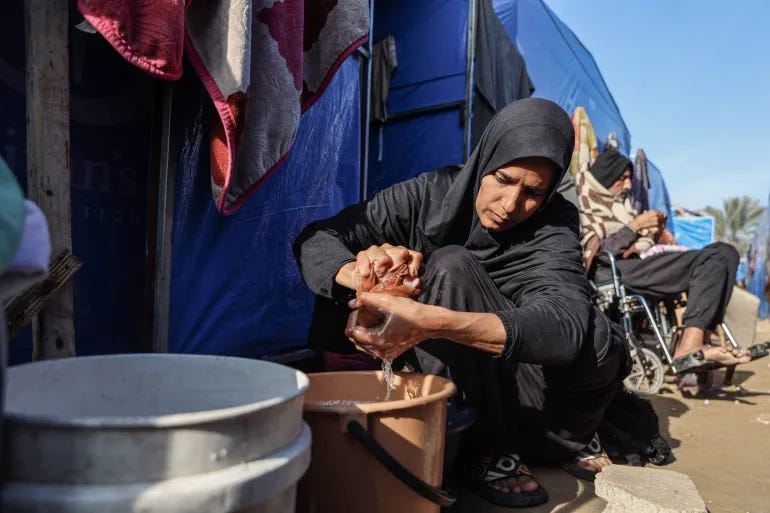Gaza Braces for Ceasefire Amid Ongoing Bombings, Residents Reflect on Trauma and Loss
Palestinians hold cautious hope as Israel’s bombardment continues despite news of a ceasefire agreement
Deir el-Balah, Gaza Strip – On Thursday morning, the people of Gaza woke to the sound of renewed bombings, despite reports the night before that a ceasefire had been agreed between Israel and Hamas. While some Palestinians are clinging to the hope that the ceasefire will mark the end of Israel's 15-month war, which has claimed the lives of over 46,700 Palestinians, the trauma and devastation they’ve endured is far from forgotten.
In Deir el-Balah, a town in central Gaza, many residents have been displaced by the ongoing violence, having fled their homes after Israeli attacks or orders to leave. Survivors express a mixture of relief and sadness as they reflect on the loss of loved ones, but uncertainty still looms about what comes next.
Al Jazeera spoke to several residents on the day following the announcement of the ceasefire, which is set to take effect Sunday. Their words illustrate the emotional toll and the lingering fear of escalation:
The Emotional Cost of War
Nahed al-Wer, a psychiatrist displaced from the Bureij refugee camp after his home was destroyed, works at the Deir el-Balah clinic and volunteers to assist those struggling with trauma. “It feels very nice. We’re so happy. It feels like it’s Eid,” he said. “But we’ve lost people – I lost my brother, my nephew, and others. The worry remains. I'm afraid of more escalation.”
Al-Wer highlighted his deep concern that Israeli politicians may backtrack on the ceasefire agreement, a sentiment shared by many. "The nature of Israeli politics often involves escalating violence before agreeing to a ceasefire," he added, recalling the painful loss of his sister and her children in 2014. Al-Wer also expressed concern over the long-term psychological effects of the war, especially for the many individuals suffering from post-traumatic stress.
A Mother's Grief Amid Hope for Peace
Yasmeen al-Helo, a mother displaced from Shujayea, speaks with conflicting emotions. “Honestly, my feelings are indescribable. I cried and was happy at the same time,” she said. “We’ve lost so many dear people. Some are missing, some were taken by the occupation, and some were martyred.”
Though al-Helo is relieved by the potential halt to the violence, she expressed frustration at the delay of the ceasefire’s full implementation, noting that the final two days of bombings have felt even more devastating than the previous year. “I would have preferred an immediate ceasefire,” she said.
A Hope for Healing
Mohammed al-Mudawwi, who was paralyzed in an Israeli attack, shared his hopes for medical treatment abroad after enduring physical abuse and neglect while in Israeli custody. “Yesterday was the first time I laughed since the war started,” al-Mudawwi said. “I’m optimistic and hopeful because of the ceasefire. This moment is wonderful, especially for my children.”
Memories of War that Will Never Fade
Saleh Aljafarawi, a journalist displaced from northern Gaza, reflected on the mental and emotional scars left by the war. “We will never be able to forget the experiences we’ve lived through,” he said, noting that the horrors of the past 467 days will stay with him. Despite the trauma, Aljafarawi remains hopeful that with the ceasefire, Gaza’s residents will eventually rebuild their homes, even if they are destroyed. "We paid a high price in this war. We lost our families, our colleagues, and our friends,” he said. “But we’ll rebuild.”
As Gaza awaits the formal implementation of the ceasefire, residents are grappling with the uncertainty of the future while reflecting on the immense cost of this long and brutal conflict.


